The TELSIG Podcast
Does technology help or hinder learning? How can we make better use of digital tools in teaching? Phil Martin from the University of York dives into the neon-lit underworld of technology enhanced learning through conversations with experts in teaching and learning design. Each episode looks at how educators can stay current with their use of learning tech in this ever-changing landscape.
Episodes
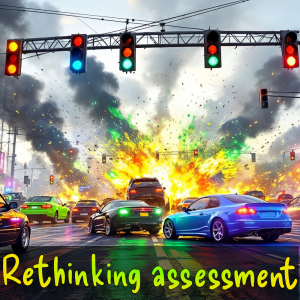
Tuesday May 27, 2025
Tuesday May 27, 2025
Today I'm talking with Danny Liu about assessment in the age of AI. So far, the idea of a 'traffic light' approach to assessment has been gaining traction in higher education in response to the widespread availability of generative AI. Using the traffic light metaphor, assignments are colour coded according to the level of AI use deemed to be permissible. However, as these systems rely solely on student self report on the level of AI use, Danny argues that there is a danger that they lose their value as valid assessment tools.
Danny talks us through the two-lane approach to assessment that has been adopted at the University of Sydney, distinguishing between 'Lane One' supervised assessments aimed at measuring student capability and 'Lane Two' assessments that encourage learning and engagement with AI. We talk through the process of making structural assessment changes, responses from academics, retaining student engagement, and a range of other topics.
Guest bio
Danny is a molecular biologist by training, programmer by night, researcher and faculty developer by day, and educator at heart. A multiple international and national teaching award winner, he works at the confluence of artificial intelligence, student engagement, and educational technology. A Professor of Educational Technologies at the University of Sydney, he co-chairs the University's AI in Education working group, and leads the Cogniti.ai initiative that puts educators in the driver's seat of AI.
Find Danny on Linkedin at https://www.linkedin.com/in/dannydotliu/ and check out the University of Sydney’s AI for Educators resource page at https://canvas.sydney.edu.au/courses/63765
Further reading
Corbin, T., Dawson, P. and Liu, D. (2025). Talk is cheap: why structural assessment changes are needed for a time of GenAI. Assessment & Evaluation in Higher Education, pp. 1–11. Available at: doi: 10.1080/02602938.2025.2503964.
Liu, D. (2025). A "two lane" approach to assessment in the age of AI: Balancing integrity with relevance. Digitally Enhanced Education Webinars. Available at: https://www.youtube.com/watch?v=Hf8-b1H3qOU [accessed 16th May 2025]
Liu, D., and A. Bridgeman. (2023). 'What to Do about Assessments If we Can’t out-Design or out-Run AI? Teaching@Sydney. Available at: https://educational-innovation.sydney.edu.au/teaching%40sydney/what-to-do-about-assessments-if-we-cant-out-design-or-out-run-ai/

Thursday May 15, 2025
Are we eroding our critical thinking? With Michael Gerlich
Thursday May 15, 2025
Thursday May 15, 2025
Today I’m talking to Michael Gerlich about his recent study on the potential effects of AI on critical thinking. While much ink has been spilled discussing the value of the traditional essay in a post GPT landscape, much of the conversation has focused on assessment and questions of authorship. Perhaps unsurprisingly, less time has been given to the impact on the learning process itself. The phrase ‘I write to know what I think’ alludes to the value of putting one’s ideas under the microscope, and of sometimes having to rethink cherished beliefs as we spell them out to ourselves at sentence level. If we outsource this process to ChatGPT, are we losing something valuable? We talk through Michael’s data, his own interpretations, and continue the conversation on whether generative AI is ‘just another tool’, or something more.
Guest bio
Prof. Dr Michael Gerlich is Professor of Management and Head of Centre for Strategic Corporate Foresight and Sustainability at SBS Swiss Business School, a Swiss University of Applied Sciences Institute. His academic and professional work focuses on the societal implications of artificial intelligence, change management, and strategic foresight, with a particular interest in bridging research and practice in both policy and business settings.
With prior experience in government advisory and leadership roles across Europe, Central Asia, and the Middle East, he has supported a range of public and private institutions in matters related to economic development, export strategy, and organisational transformation. His research on artificial intelligence has addressed topics such as cognitive offloading, critical thinking, and the ethical dimensions of technology in education and society. His work has been mentioned globally by media including Forbes, Financial Times, The Economist and many more.
Prof. Gerlich has contributed to academic and public debates through his writing and through speaking engagements at international conferences, including events hosted by the United Nations. He holds full, visiting and affiliated teaching roles in Zurich, London (LSE), and Cambridge (ARU), and remains actively involved in interdisciplinary work at the intersection of technology, sociology and human behaviour.
Further reading
Bunn, P.D. (2025). The AI Crisis in Higher Education: Or, on the importance of doing things badly. Everything was beautiful. https://everythingwasbeautiful.substack.com/p/the-ai-crisis-in-higher-education?utm_campaign=posts-open-in-app&triedRedirect=true
Gerlich, M. (2025). AI Tools in Society: Impacts on Cognitive Offloading and the Future of Critical Thinking. Societies, 15(1), 6. https://doi.org/10.3390/soc15010006
Lee H.P, Sarkar A, Tankelevitch L, Drosos I, Rintel S, Banks R, Wilson N. (2025). The impact of generative AI on critical thinking: Self-reported reductions in cognitive effort and confidence effects from a survey of knowledge workers. Proceedings of the 2025 CHI Conference on Human Factors in Computing Systems. https://www.microsoft.com/en-us/research/wp-content/uploads/2025/01/lee_2025_ai_critical_thinking_survey.pdf
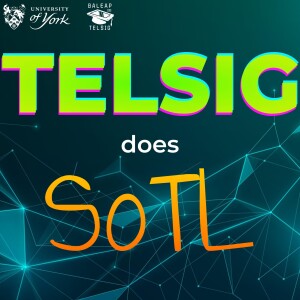
Friday Apr 18, 2025
Why do we need SoTL? With Jane Pritchard
Friday Apr 18, 2025
Friday Apr 18, 2025
In this episode of TELSIG does SoTL, we are joined by Jane Pritchard to discuss the evolving landscape of scholarly teaching. Jane describes her transition from a material scientist to an educational developer at the University of Glasgow, emphasizing the importance of evidence-based educational enhancement. We go on to cover the historical development of SoTL since the early '90s, the role of interdisciplinary collaboration, the impact of the COVID-19 pandemic on teaching practices, the intricacies of assessment and inclusivity in higher education, and the importance of challenging traditional practices and encouraging purposeful inquiry.
Jane Pritchard is the head of Educational Development at the University of Oxford's Centre for Teaching of Learning. She is widely published in the field of educational development and scholarship of teaching and learning, particularly in the field of institutional support for SoTL.
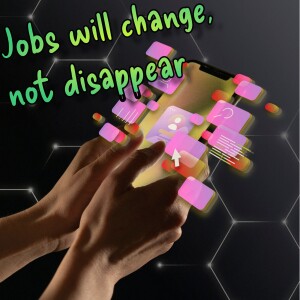
Tuesday Mar 25, 2025
Tuesday Mar 25, 2025
What do academic skills do students need in higher education today? Does ‘embracing’ AI come at the cost of developing higher order thinking skills? I’m joined by Computer Science Lecturer Mike O’Dea and Associate Lecturer in Academic Skills Paulina Melichova to get their take on this. We reflect on Mike’s recent AI training session, and talk about how much curriculum time should be given to AI literacies, whether authentic assessments come at the cost of validity, the merits of the traffic light system, and how to make digital skills training accessible to all students and staff.
Michael O’Dea is a Lecturer in Computer Science at the University of York and a Senior Fellow of the HEA.. He holds an Ed.D. from the University of Leeds, which was a technology Enhanced Learning study looking at Serious Games. His current research interests are focussed on AI literacy, Technology Acceptance and Computer Science Education. He is particularly interested in the application and integration of AI into learning and teaching.
His recent publications include articles for Policy Futures in Education, The Journal of University Teaching and Learning Practice, The Times Higher Education Campus, Wonkhe and Emerald Publishing. He is an Associate Editor for the Journal of University Teaching and Learning Practice. He has delivered a number of workshops and invited talks on AI literacy and on the impact of GenAI in education, including for the Chartered Association of Business Schools, QAA, SRHE and the Open Access Publishing Association. Currently he is the Principle Investigator on a QAA Collaborative Enhancement Project looking at the impact of disruptive technologies on Graduate Attributes.
Paulina Melichova is an Associate Lecturer in Skills Development at the University of York, and a Fellow of the HEA. Currently completing her MSc in Applied Social and Educational Research, her research focuses on wellbeing in academia as well as diary and other creative research methods, with a particular emphasis on emotional labour among academics. As a coach, Paulina integrates coaching and mentoring techniques into her teaching of academic and communication skills, empowering students to take ownership of their personal and professional development.
In addition to her academic work, Paulina is also a professional mindset and communication coach, drawing on her expertise to equip ambitious individuals with the tools to create the career they aspire to.
Further reading
HEPI (2014). Student Academic Experience Survey 2024. [Online]. HEPI, UK. Available at: https://www.hepi.ac.uk/2024/06/13/student-academic-experience-survey-2024/
O'Dea, M. (2025). AI: an introduction to the basics. Available at : https://drive.google.com/file/d/1egvD8Y-MSyWctEQID_3_WN1ZXPBSd2Sj/view
Perkins, M. and Roe, J. (2024). Rather than restrict the use of AI, let’s embrace the challenge it offers [Online]. Times Higher Education. Available at https://www.timeshighereducation.com/campus/rather-restrict-use-ai-lets-embrace-challenge-it-offers
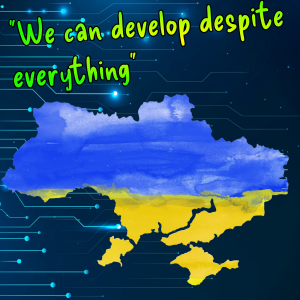
Monday Feb 24, 2025
Monday Feb 24, 2025
As we approach the third anniversary of Russia’s invasion of Ukraine, we discuss the impact of the war on Ukrainian higher education. Many university buildings have suffered extensive physical damage, especially those in the east of the country, and online teaching, a distant memory for most, is for many Ukrainian students and teachers still a reality. Despite the hardships, learning and teaching carries on, and technology and innovative teaching techniques have helped Ukrainian education to thrive.
In this episode we talk to academics from the field of Geography: Dariia Kholiavchuk, Kate Borysenko, Liz Hurrell and Simon Hutchinson about their collaborative paper on the role of digital technology in supporting geographical education in Ukraine during the ongoing conflict. We discuss the practical applications of virtual field trips, and the implications of teaching geography under war conditions. Topics include using tools like Google Earth and ThingLink to provide remote and hybrid learning experiences, the importance of fieldwork, sustaining student motivation and mental health, and the importance of the field of Geography to the eventual reconstruction of Ukraine. Finally we also talk about how the international academic community can contribute to educational resilience in Ukraine.
Further reading
Hutchinson, S.M., Hurrell, E.R., Borysenko, K., Popov, V., Kholiavchuk, D. & Popiuk, Y. (2024) Resilient education: The role of digital technology in supporting geographical education in Ukraine. Transactions of the Institute of British Geographers, 00, e12728. Available from: https://doi.org/10.1111/tran.12728
Guest bios
Kateryna Borysenko is Associate Professor in the Department of Physical Geography and Cartography Faculty of Geology, Geography, Recreation and Tourism at V. N. Karazin Kharkiv National University. She is dedicated to the development of education and science in the city of Kharkiv, is widely published in the field of Geographical training and education, and leads educational practices in her department.
k.borysenko@karazin.ua
Daria Kholiavchuk is an Associate Professor at the Department of Physical Geography, Geomorphology, and Paleogeography at Yuriy Fedkovych Chernivtsi National University in Western Ukraine. As the program leader for bachelor students in Geography, she is dedicated to fostering the next generation of geographers skilled in sustainability and postwar recovery. Her research focuses on climate change and natural hazards management. Daria is involved in projects to build adaptive capacities in the Ukrainian Carpathians and promote cross-border ecological management. Currently, she participates in the resilient education and research initiative, supported by British colleagues through digital tools. d.kholyavchuk@chnu.edu.ua
Dr Simon M Hutchinson is a Reader / Associate Professor at the University of Salford. He believes that Environmental Education should be accessible to everyone and the using Digital Visualisation Tools (DVTs) can help to achieve this equity. His research on palaeoenvironmental records(e.g., peat, cave and lake sediments) in the Carpathian Mountains (mainly in Romania) mean that his own field work has taken him close to the border; he hopes one day to be able to extend this into Ukraine. s.m.hutchinson@salford.ac.uk
Liz Hurrell is a Senior Lecturer in Physical Geographer in the Department of Environment and Geography at York and an Associate Lecturer for the Open University. She has a passion for Geography Higher Education with interests in climate education, equality, diversity and inclusion, hybrid/online education as well as fieldwork. The latter opened up a conversation between York-Salford-Kharkiv on how virtual field trips can support education during the war. liz.hurrell@york.ac.uk

Friday Jan 03, 2025
Friday Jan 03, 2025
In this third installment of the SoTL flavoured TELSIG podcast, Phil is joined again by Lucy Turner Voakes from York's Academic Practice team, and Nick Glover from Inclusive Learning to discuss equality, diversity, and inclusion (EDI) in higher education and its interactions with SoTL. The conversation explores the catalysts for heightened attention on EDI, such as award gaps for black students, the interplay between broader social issues and higher education, and the importance of data-driven approaches. We talk about the barriers to implementing inclusive practices, the role of scholarship, and the complexities of measuring success. The discussion also touches on the potential benefits of partnerships between students and staff in fostering a more inclusive educational environment.
Guest profile
Nicholas Glover works in the Inclusive Education Team as an Inclusive Education Adviser. He has a background in critical approaches to student engagement and student voice. He is interested in the co-creation of learning, teaching and assessment in HE, particularly the ways in which student-staff partnerships can foster and embed inclusive practices within the classroom and throughout universities. He is currently working on a number of educational enhancement projects, including the University’s new Student Success Projects Fund, which is supporting students and staff to work collaboratively to innovate aspects of learning, teaching and assessment.
Related links
Matthews, K. (2017). Five Propositions for Genuine Students as Partners Practice | International Journal for Students as Partners
Advance HE Framework - Student Engagement through Partnership
University of York Inclusive Learning Toolkit
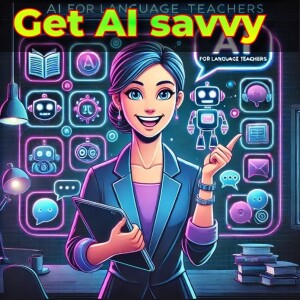
Sunday Dec 08, 2024
Enhancing language teaching with the latest AI tools, with Joe Dale
Sunday Dec 08, 2024
Sunday Dec 08, 2024
Today we take a tour of all the free, nearly free and paid-for tools that can help language teachers create lessons and materials while also helping students become more independent learners. We talk about ways in which we can work more efficiently, but also actively boost learning gains in the process.
The discussion covers practical uses of AI for generating lesson materials, and tools like Mizou for practising conversation. Also, what is ChatGPT up to these days? We get into what makes an effective prompt, and how to navigate the limitations and opportunities of free and paid-for AI tools. This episode is a must-listen for language teachers looking to explore AI technologies to improve classroom and preparatory activities.
The conversation touches on a range of online tools, all of which are listed below:
Immersive Reader https://support.microsoft.com/en-gb/office/use-immersive-reader-in-word-a857949f-c91e-4c97-977c-a4efcaf9b3c1
ChatGPT https://chatgpt.com
Wordwall https://wordwall.net
Learning Apps https://learningapps.org
Diffit https://app.diffit.me
MultilingProfiler https://www.multilingprofiler.net
Photoscan https://apps.microsoft.com/detail/9nblggh4s87w?hl=en-gb&gl=CL
Padlet https://padlet.com
Perplexity AI https://www.perplexity.ai
Claude https://claude.ai
Mizou https://mizou.com
AudioPen https://audiopen.ai
Magic School https://www.magicschool.ai
TurboScribe https://turboscribe.ai
Adobe Firefly https://www.adobe.com/products/firefly.html
Dan Fitzpatrick’s resource page https://www.theaieducator.io
Joe’s Facebook group https://www.facebook.com/groups/languageteachingwithai
Guest profile
Joe Dale is an independent languages consultant from the UK who works with a range of organisations such as Network for Languages, ALL, The British Council, the BBC, Skype, Microsoft and The Guardian. He was host of the TES MFL forum for six years, former SSAT Languages Lead Practitioner, a regular conference speaker and recognised expert on technology and language learning. He has spoken at conferences and run training courses in Europe, North America, South America, the Middle East, the Far East and Australasia. He was a member of the Ministerial Steering Group on languages for the UK coalition government and advised on the Linguanet Worldwide project for The Language Company. He created ICT activities for the new Institut Français, ALL and Network for Languages Primary French Project Niveau Bleu, Blanc and Rouge courses and was short-listed for a NAACE Impact Award in 2013 too. Joe supported the Erasmus Plus project Conflict to Cooperation with 5 European countries and the Erasmus Plus Project Learning to think and live outside the box. He recently organised and co-hosted a 10 part series of webinars Saturday Tech-Talk in collaboration with the British Council in Indonesia and iTELL and worked on the Nusantara Go project for the British Council in Indonesia and PearTree Languages in 2022. He also worked on the Supporting Schools Reform in Algeria project through the British Council 2019-2020. He is currently working on the Stories on the Move project with the University of Reading. He was recently described in a Guardian article as an 'MFL guru' and 'the man behind the #mfltwitterati.'. Joe’s new Facebook group ‘Language Teaching with AI' already has over 5,300 members.

Tuesday Nov 19, 2024
Building a career in learning technology, with Lilian Joy and Putu Sadhvi Sita
Tuesday Nov 19, 2024
Tuesday Nov 19, 2024
What is the role of a learning technologist in modern higher education? What are the career paths available, what skills do you need, and what does a typical working day look like? Today we’re joined by Lilian Joy from the University of York and Sita from the University of Sheffield: both learning technologists at different stages of their careers, who are able to offer their own answers to some of these questions.
We get into accessibility, working with SMEs, the importance of pedagogical knowledge, how to keep your skill set current, and a range of other topics. This episode will be of interest to anyone thinking of switching career lanes, starting a new role in learning tech, or who simply wants to hear how seasoned practitioners go about their work.
Lilian Joy is the Digital Accessibility Manager (previously Digital Education Manager) at the University of York, who is passionate about staff development and the 'learning' in technology-enhanced learning. She has over 30 years' experience as a teacher, trainer, e-learning manager and consultant in vocational education, higher education and the private sector. Her current research interests include accessible maths, the experience of disabled staff and students and appreciative inquiry as a model for development.
Putu Sadhvi Sita (Sita) is a learning technologist currently working as a Faculty Digital Learning Officer at the University of Sheffield. With two years of experience, including time at the University of Leeds, she specializes in game-based learning, gamification, and multimedia-enhanced eLearning solutions. Before moving into digital education, Sita taught English in Southeast Asia and holds an MA in TESOL & ICT from the University of Leeds and a Bachelor of Marine Engineering from Indonesia.

Wednesday Nov 06, 2024
Wednesday Nov 06, 2024
This is the second in our SoTL spin off series where we move the focus from technology to the Scholarship of Teaching and Learning. Today we are joined by lecturers Jess Hargreaves, who teaches in data science, and Yaprak Tavman from the Department of Economics. We talk about how teaching works in their fields and how they’ve incorporated scholarly teaching into their own practice. They discuss their backgrounds, motivations, and current projects, including problem-based learning and technology-enhanced active learning. The conversation touches on the importance of collaboration, dissemination of scholarly work, and the challenges of navigating educational literature. We look at the distinctive features of the two fields when it comes to teaching, and look at how teachers across disciplines can keep their teaching practice current and get moving towards publication.
Dr Jess Hargreaves is a Lecturer in Data Science in the Department of Mathematics. Her research interests include: time series analysis; the application of statistical methods and tools to sport; and teaching and learning pedagogy.
Yaprak Tavman joined the Department of Economics and Related Studies at the University of York in January 2022. Prior to that, she worked as an Assistant Professor in Economics at Newcastle University, and at Northeastern University - London. Yaprak is a fellow of Advance HE. Her areas of interest in scholarship of teaching and learning include active and problem-based learning, technology-enhanced teaching, and diversity and inclusion.
Further reading
Healey, M, and Healey, R,. (2023). Searching the Literature on Scholarship of Teaching and Learning (SoTL): An Academic Literacies Perspective Part 1. Teaching & Learning Inquiry, 11. Available at: https://doi.org/10.20343/teachlearninqu.11.4
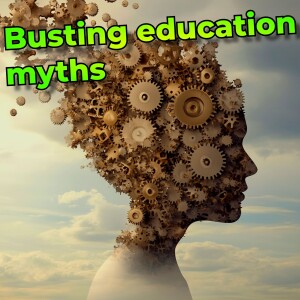
Tuesday Oct 22, 2024
Tuesday Oct 22, 2024
Nidhi Sachdeva from the University of Toronto talks about the science of learning, myth-busting educational misconceptions, and the role of technology in teaching. We get into cognitive load theory, explicit instruction, and question the efficacy of demanding reading loads in higher education. Nidhi shares her expertise on structured teaching methods, the importance of factual knowledge in the age of AI, and her efforts to simplify educational research for teachers. We tackle the perennial question of why most academic writing sucks, and talk about the best ways for practitioners to get started on their own research.
Dr. Nidhi Sachdeva is based at the University of Toronto’s Ontario Institute for Studies in Education (OISE). She is interested in designing and integrating evidence-informed instructional practices. Recently, she has been researching this through the notion of microlearning and cognitive science. She developed a range of microlearning content using the science of learning as guidelines. You can find some of her work in the video series on How Learning Happens. She also developed the microlearning video series for peerScholar.
Nidhi’s substack, which she co authors with Jim Hewitt, is called The Science of Learning and is available at https://scienceoflearning.substack.com/. Nidhi and Jim have also appeared on the Chalk and Talk podcast, and Nidhi was a recent guest on the Progressively Incorrect podcast.
Further reading
Kirschner, P. A., and Hendrick, C. (2020). How learning happens: Seminal works in educational psychology and what they mean in practice. Abingdon: Routledge.
Miller, G. A. (1956). The magical number seven, plus or minus two: Some limits on our capacity for processing information. Psychological Review, 63(2), 81–97. Available at: https://doi.org/10.1037/h0043158
Rosenshine, B. (2010), Principles of Instruction: Research-Based Strategies that All Teachers Should Know. American Educator, 36 (1), 12-19.
Sweller, J., Ayres, P. and Kauyga, S. (2011). Cognitive Load Theory (Explorations in the Learning Sciences, Instructional Systems and Performance Technologies Book 1). London: Springer.
Willingham, D. (2024). Professor of Psychology Daniel Willingham Speaks to UVA's Class of 2024. [Video]. Available at https://www.youtube.com/watch?v=FEhallt7ZCA [Accessed 20th October 2024].

Phil Martin is the TELSIG events coordinator and lecturer at the University of York's International Pathway College.
This podcast is recorded at the Creativity Lab with the support of Sam Hazeldine and Helen Claxton.
Theme music: "Smoke" by SoulProdMusic
Contact: phil.martin@york.ac.uk








